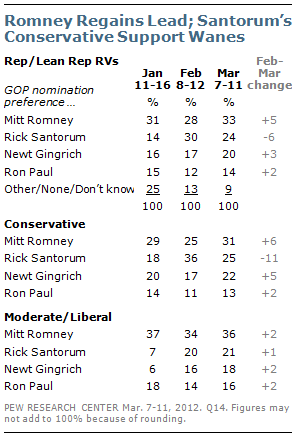
Mitt Romney has regained the lead in the support for his party’s presidential nomination, as conservative backing for Rick Santorum has declined. Romney currently holds a 33% to 24% lead over Santorum among registered Republican and Republican-leaning independent voters, with 20% backing Newt Gingrich and 14% favoring Ron Paul.
In mid-February, Santorum was tied with Romney overall (30% vs. 28%), and held an 11-point lead over Romney among conservative Republican and Republican-leaning voters (36% vs. 25%). Today, 25% of conservative Republicans favor Santorum for the nomination, while 31% support Romney and 22% back Gingrich.
Moderate and liberal Republicans have not changed their primary preferences over the past month, with Romney holding a consistent lead among these voters.
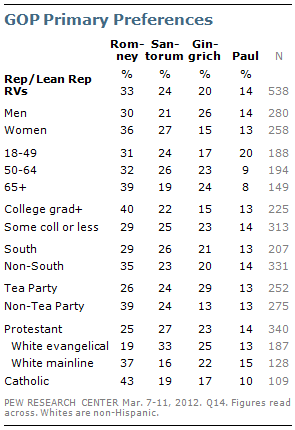
As has been the case in most of the state exit polls, Romney garners substantially less support from less educated and Tea Party Republican and Republican-leaning voters. College graduates favor Romney over Santorum by a 40% to 22% margin, while those without a college degree are more divided: 29% back Romney, 25% Santorum, and 23% Gingrich.
Tea Party Republicans split their support between Gingrich (29%), Romney (26%) and Santorum (24%), while Romney holds a double-digit lead among the roughly half of Republican and Republican-leaning voters who do not identify with the Tea Party.
Republican men are divided in their support, with 30% backing Romney, 26% Gingrich, and 21% Santorum. Among women, 36% favor Romney for the nomination, compared with 27% who back Santorum and just 15% who back Gingrich.
Religion remains a deep divide within the Republican electorate; white evangelical Republicans are less likely than white mainline Protestants and Catholics to favor Romney for the nomination.
More Worry about Extended GOP Race
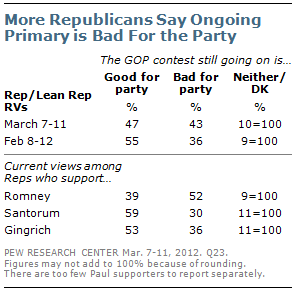
A growing number of Republican and Republican-leaning voters are concerned that the unresolved campaign will be a bad thing for the Republican Party this year. A month ago, 55% said the fact that the contest was undecided and still going on was a good thing for the party, while 36% said it was a bad thing. Opinion is now divided almost evenly, with 47% saying it is good and 43% bad. Mitt Romney’s supporters are more likely to say the long campaign is a bad thing for the party (52%), than are Gingrich’s (36%) or Santorum’s (30%) supporters.
Republican evaluations of the quality of the GOP field have changed little over the course of the campaign. About half (49%) say the candidates for the party’s nomination are excellent (6%) or good (43%), while 48% say they are
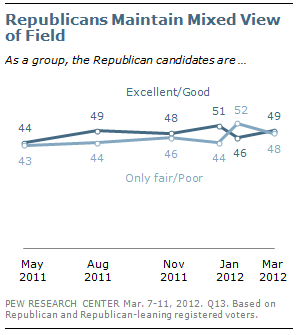
only fair (39%) or poor (9%). In February 2008, a few weeks after Super Tuesday, 60% of Republican and Republican-leaning voters said the field was excellent or good, while 38% said it was only fair or poor. Democrats also were more enthusiastic about their field in 2008 – fully 80% said they had excellent or good candidates.
Conservative Republicans are somewhat more satisfied with the quality of candidates than are moderates and liberals (55% excellent or good vs. 43%). Similarly, 60% of Tea Party supporters say the candidates are excellent or good compared with 41% of Republicans who do not agree with the Tea Party.
Republican Views of Romney, Santorum
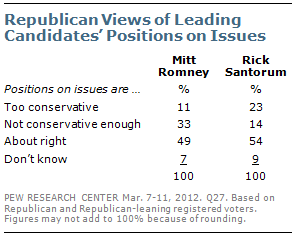
When asked about the candidates’ positions on the issues, roughly half of Republican voters say Romney’s and Santorum’s positions are about right. More say Santorum is too conservative (23%) than say he is not conservative enough (14%). By contrast, more see Romney as not conservative enough (33%) than as too conservative (11%).
More than four-in-ten (44%) conservative Republicans say that Romney is not conservative enough in his positions on issues. An equal number of white evangelical Republicans think Romney is not conservative enough, as do 56% of Republican and
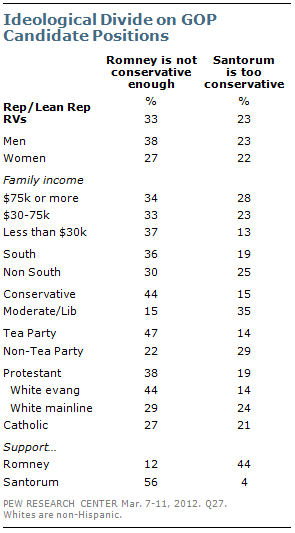
Republican-leaning voters who back Rick Santorum for the nomination. Men are significantly more likely than women to say Romney is not conservative enough in his position on the issues (38% vs. 27%).
The impression that Santorum is too conservative is less common among GOP voters overall, but held by 44% of those who back Mitt Romney, and 35% of moderate and liberal Republicans. This view is also more prevalent among Republicans with family incomes of $75,000 or more (28%) than among those earning $30,000 or less (13%).
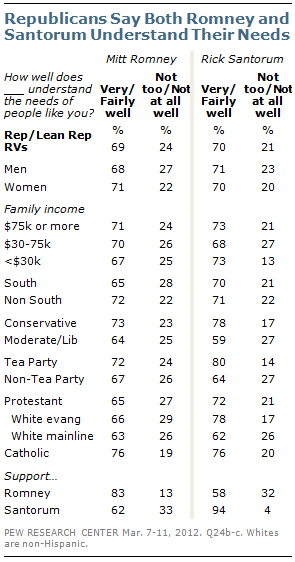
There is far more consensus among GOP voters about whether the candidates understand the needs of people like them. About seven-in-ten Republican and Republican-leaning independent voters say that Santorum (70%) and Romney (69%) understand the needs of people like them very or fairly well.
There is little difference across most groups within the Republican electorate. Broad majorities of men and women, those with high and low incomes, and Southern and non-Southern Republican voters say each candidate understands the needs of people like them.
Conservative Republicans give Santorum higher marks than do moderates and liberals on this question (78% vs. 59%). While 78% of white evangelical Republicans say Santorum understands the needs of people like them, fewer (66%) say the same about Romney.
Voters’ Knowledge of Candidates’ Religious Preferences
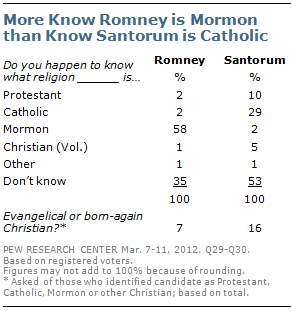
The percentage of all registered voters who know that Mitt Romney is Mormon has increased from 48% in November to 58%. A majority of Democratic and Democratic-leaning voters (55%) know Romney’s religion, as do 65% of Republicans and Republican-leaners.
Only about three-in-ten voters (29%) can identify Rick Santorum as a Catholic. This includes 32% of Republican and Republican-leaning voters and 27% of Democrats and Democratic-leaners. Another 15% identify Santorum as either Protestant (10%) or volunteer that he is Christian (5%). About half (53%) of voters say they don’t know his religion.
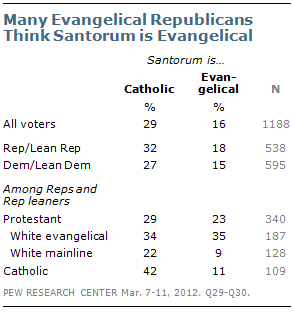
In a follow-up question, about a third of those who identify Santorum as a Christian – 16% of voters overall – say they believe he is an evangelical or born-again Christian.
Among Republican and Republican-leaning voters, 42% of Catholics know that the former Pennsylvania senator is Catholic compared with 29% of Protestants.
About a third (35%) of white evangelical Protestant Republicans say Santorum is evangelical; this contrasts with just 9% of white mainline Protestants and 11% of Catholics. In fact, as many white evangelical Republicans believe Santorum is an evangelical Christian (35%) as know that he is Catholic (34%).